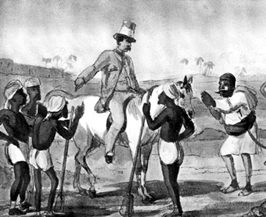Magistrate
Magistrate precursor of modern magistrates are the amils and faujdars of the pre-British period. The faujdari or magisterial powers of the nawab was formally abolished in 1793. But the post of the magistrate of the British brand was created from 1772 with limited powers within the diwani administration. The district collector was also the magistrate up to 1793.
Under the cornwallis code the magisterial powers of the district collector were transferred to the district judge whose designation became District Judge and Magistrate. From 1828, magistracy was taken away from the judge and was attached to the district collector whose designation became District Magistrate and Collector, a status that continued even after the end of the colonial rule.

Magistrates are either stipendiary or honorary judges administering criminal justice in petty and less grave offences. They take cognizance of offences either on written complainant by an aggrieved person or on police report or on their own knowledge and information about commission of offences. Police can arrest an offender and investigate into a cognizable offence without any warrant of arrest from or order of investigation by the magistrate, but cannot do so in case of a non-cognizable offence. Grave offences which cannot be tried by the magistrates are sent to the court of session or such other court or tribunal for trial.
According to power exercised magistrates are of three categories, magistrates of the first class, magistrates of the second class and magistrates of the third class. In every district outside a metropolitan area the deputy commissioner was appointed as the District Magistrate, Additional Deputy Commissioner as the Additional District Magistrate and Joint Deputy Commissioner as the Joint District Magistrate each having power of a magistrate of the first class. Besides, in each district outside the metropolitan area other magistrates of first, second or third class were appointed by the government.
All other magistrates appointed in each district were subordinate to the District Magistrate though Additional District Magistrate and Joint District Magistrate exercised all the powers of the District Magistrate who could distribute business among the subordinate magistrates. A magistrate of the first or second class was placed in charge of an upazila/thana and such a magistrate was called a Upazila/Thana Magistrate and he/she could take cognizance of offences occurring in any part of that thana. Government could confer additional power on any magistrate. In a Metropolitan area Chief Metropolitan Magistrate, Additional Chief Metropolitan Magistrate and Metropolitan Magistrates were appointed for exercising powers of magistrates of first class in such area or any part thereof. All other Metropolitan magistrates including the Additional Chief Metropolitan Magistrate were subordinate to the Chief Metropolitan Magistrate who distributed business among the subordinate magistrates.
Government may appoint any citizen of the country as a Justice of the Peace (honorary magistrate) for any local area. Government could invest the Chief Metropolitan Magistrate, Additional Chief Metropolitan Magistrate, District Magistrate or any Additional District Magistrate with power to try all offences not punishable with death, and any magistrate of the first class to try all offences not punishable with death or imprisonment for life or imprisonment for a term exceeding ten years. District magistrate was the head of the magistracy in a district outside the metropolitan area, and Chief Metropolitan Magistrate was the head of the magistracy in the metropolitan area, and they exercise some additional powers.
Any magistrate of the first class or metropolitan magistrate could impose a sentence of imprisonment for a term not exceeding five years including such solitary confinement as was authorised by law and fine not exceeding ten thousand taka and whipping. Any magistrate of the second class could impose a sentence of imprisonment for a term not exceeding three years including such solitary confinement as is authorised by law and fine not exceeding five thousand taka. Any magistrate of the third class could impose a sentence of imprisonment for a term not exceeding two years and fine not exceeding two thousand taka. The magistrate could award such term of additional imprisonment in default of payment of fine not exceeding one fourth of the period of imprisonment which such magistrate was competent to inflict as punishment for the offence. A magistrate invested with the power to try grave offences could pass a higher sentence of imprisonment not exceeding seven years. After amendment of the Code of Criminal Procedure in 2007 to give effect to the judgement in Mazder Hossain case for separation of the judiciary from the executive branch of the government with effect from 1st of November 2007 practice of investing the civil servants of the administrative cadre of the government has been discontinued and since then judicial officers of the civil service (judicial) have been invested with magisterial powers. An Additional District judge has been invested with the 1st class magisterial powers, and designated as the Chief Judicial Magistrate of the district exercising all the powers of the District Magistrate, a joint District Judge has been invested with the powers of the 1st class Magistrate and designated as Additinal Chief Judicial Magistrate of the district exercising all the powers of the Additional District Magistrate. Senior Assistant Judges have been invested with the powers of magistrate of the first class, experienced Assistant Judge with the powers of the magistrate of 2nd class and a junior Assistant Judge with the powers of magistrate of the 3rd class. Similarly an Additional District Judge has been invested with the designation and powers of the Chief Metropolitan Magistrate, a Joint District Judge those of an Additional Metropolitan Magistrate and Senior Assistant Judges those of Matropolitan Magistrates. Former Magistrates of the administrative cadre are now invested with powers of administrative nature with the designation of executive magistrates with additional power of holding mobile courts with power to impose fine and in default imprisonment after holding summary trial of the offenders. [Kazi Ebadul Hoque]
